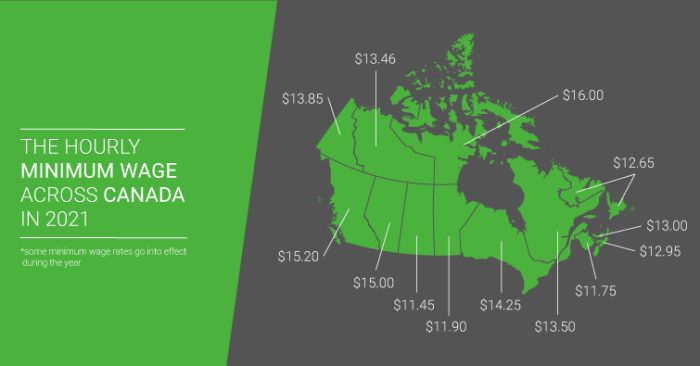The Average Minimum Wage in Canada in 2021
 Publié le 11 March 2021
Publié le 11 March 2021
Examining the current state and upcoming changes to the average minimum wage in Canada in 2021 is important information for workers and job seekers looking for their next opportunity.
A minimum wage is the legal minimum of pay that an employer can offer their employees. The average minimum wage in Canada in 2021 is a matter of provincial and territorial jurisdiction. This means that each province and territory sets their own minimum wage, raising or lowering it through legislation. While Canada at one point had a separate federal minimum wage for employees of the federal government, since 1996 every federal employee has been subject to the minimum wage of the province or territory where their job is located.
The Average Minimum Wage in 2021 Per Hour by Province
- British Columbia: $15.20
- Alberta: $15.00
- Saskatchewan: $11.45
- Manitoba: $11.90
- Ontario:
$14.25$14.35 - Quebec: $13.50
- New Brunswick: $11.75
- Nova Scotia: $12.95
- Prince Edward Island: $13.00
- Newfoundland and Labrador: $12.65
- Yukon: $13.85
- Northwest Territories: $13.46
- Nunavut: $16.00

A Brief History of the Minimum Wage in Canada
The minimum wage in Canada dates back over a century to 1918. This was the year that Manitoba became the first province to pass legislation establishing a minimum wage. By 1920, only two years later, an additional five provinces had also established a minimum wage, stretching from British Columbia to Nova Scotia, giving the principal of legally enshrined wage rates a firm hold across the country. The last province to establish its own minimum wage was Prince Edward Island in 1960. It should be noted that these early minimum wage laws did not apply to every job, and also established different minimum wages based on gender — a practise not fully abolished until 1974.
Why Do Some Provinces Have Multiple Minimum Wages?
Some provinces actually have multiple minimum wages that apply to different industries and job types, meaning that the average minimum wage in Canada in 2021 is also affected by job type as well as location. Typically, these alternative minimum wages allow business owners to pay people working in certain job types – commonly liquor servers such as food servers and bartenders – a lower wage because they have the possibility to earn money through gratuities and tips. Ontario and Quebec currently have this tiered system in place, while Alberta allows a lower minimum wage for students. British Columbia currently has a liquor server minimum wage, but it will be effectively eliminated in June 2021, when the general minimum wage and liquor server minimum wage are raised to the same amount.
What Is the Consumer Price Index?
As defined by Statistics Canada, the Consumer Price Index (CPI) “represents changes in prices as experienced by Canadian consumers. It measures price change by comparing, through time, the cost of a fixed basket of goods and services.” There are currently seven provinces/territories that tie their minimum wage rate to the Consumer Price Index. This means that changes in the 2020 CPI will be reflected in changes to the 2021 minimum wage rates, based on dates and amounts set forth by provincial legislation. In theory, this results in a minimum wage that better reflects the true cost of living and housing.
Quick Minimum Wage Facts*
- 10.4% of all Canadian employees earn minimum wage
- 58.8% of minimum wage earners are women
- 34.9% of minimum wage earners have a postsecondary degree/diploma
- 47.7% of minimum wage earners are over the age of 24
- 13.4% of minimum wage earners in 2018 are 55 or older, compared to 5.1% in 1998
*data from a 2019 Statistics Canada report.
Breaking Down the 2021 Minimum Wage in Each Province/Territory
British Columbia – $15.20 per hour (Effective June 1st, 2021)
The 2021 minimum wage in British Columbia is $15.20 per hour effective on June 1st, 2021. This is a $0.40 raise from the current rate of $14.60, a 2.8% increase which makes BC the third Canadian province or territory to offer a minimum wage of $15.00 or higher. The 2021 minimum wage increase in BC is unique as the new rate will also apply to those making the alternate minimum wage, primarily liquor servers, farm workers and caretakers. For people working in these job roles, their wage will grow from $13.95 to $15.20, an increase of just under 9%.
Alberta – $15.00 per hour
The 2021 minimum wage in Alberta is $15.00 per hour, remaining at the same rate since 2018. For students under the age of 18 working part-time jobs while in school, they will have an alternative 2021 minimum wage of $13.00 per hour, remaining unchanged from 2019. There are also additional exemptions based on job type, including real estate brokers, certain salespersons, non-profit counsellors and more. Alberta was the first province in Canada with a $15.00 per hour minimum wage.
Saskatchewan – $11.45 per hour
The 2021 minimum wage in Saskatchewan is $11.45 per hour. This is the lowest hourly minimum wage in all of Canada. Saskatchewan ties its minimum wage to the previous years Consumer Price Index, with changes scheduled to happen in October. This means that the 2021 minimum wage in Saskatchewan could potentially rise in October, as it did in 2020 from $11.32 per hour to the current rate.
Manitoba – $11.90 per hour
The 2021 minimum wage in Manitoba is $11.90 per hour. Despite being the province that first instituted a minimum wage and having an important history with the labour movement, this is the third-lowest hourly rate in the country, but in fairness the provincial government did institute a $0.25 raise in October 2020, up 2.1% from $11.65 per hour.
Ontario – $14.25 per hour
The current 2021 minimum wage in Ontario is $14.25 per hour. Like several provinces, Ontario currently ties its minimum wage rate to the Consumer Price Index, meaning that it could likely increase effective October 2021 but the exact resulting wage is currently unknown. Whatever the resulting wage for Ontario workers, it will be less dramatic than when the provincial minimum wage rose 21% in 2018, from $11.60 to $14.00, although it was still likely to fall short of the canceled $15 minimum wage in Ontario.
UPDATED: Ontario – $14.35 per hour (effective October 1st, 2021)
It has been announced that the 2021 minimum wage in Ontario will increase to $14.35 per hour on October 1st, 2021. This is a $0.10 raise, representing a 0.07% increase in the provincial minimum wage.
Ontario features multiple minimum wages for different job types, each of which will increase on October 1st. The liquor server minimum wage, affecting thousands of people in the restaurant and hospitality industry, will increase from $12.45 to $12.55 per hour, and the student minimum wage will increase from $13.40 to $13.50 per hour.
Of interesting note to the many Ontarians who are now remote working or hybrid working as result of the ongoing pandemic is that there is also a minimum wage for homeworkers, which is defined as “employees who do paid work out of their own homes for an employer”. The minimum wage for homeworkers will increase from $15.40 to $15.70 per hour. Finally, the 2021 minimum wage for hunting, fishing and wilderness guides will increase from $70.00 to $71.30 per hour.
Quebec – $13.50 per hour (Effective May 1st, 2021)
The 2021 minimum wage in Quebec is $13.50 per hour, effective May 1st. This is the day a $0.40 increase becomes law, raising the minimum wage by 3% from $13.10. People who work jobs where they can receive gratuities (tips) such as bartenders and food servers will see their minimum wage rise to $10.45 from $10.80.
New Brunswick – $11.75 per hour (Effective April 1st, 2021)
The 2021 minimum wage in New Brunswick is $11.75 per hour, effective April 1st. Tied into the Consumer Price Index, the minimum wage is only raising by $0.05, up from the previous rate of $11.70 per hour, compared to previous increases of $0.20 in both 2020 and 2019.
Nova Scotia – $12.95 per hour (Effective April 1st, 2021)
The 2021 minimum wage in Nova Scotia is $12.95 per hour, effective April 1st. With the wage rate tied into the Consumer Price Index, Nova Scotians earning minimum wage will enjoy a $0.40 raise, up 3% from $12.55 per hour. This will be the second highest minimum wage rate in Atlantic Canada.
Prince Edward Island – $13.00 per hour (Effective April 1st, 2021)
The 2021 minimum wage in Prince Edward Island is $13.00 per hour, effective April 1st. The wage rate is linked to the Consumer Price Index, and will result in a $0.15 raise from $12.85 per hour. This means that despite being the smallest province in the region – and the country – PEI will have the highest minimum wage in Atlantic Canada.
Newfoundland and Labrador – $12.65 per hour (Effective October 1st, 2021)
The 2021 minimum wage in Newfoundland and Labrador is $12.65 per hour, effective October 1st. Interestingly, this will be the result of two minimum wage increases in the 2021 calendar year. The minimum wage will first be raised from $12.15 to $12.40 on April 1st, before being raised again in October. This means that the minimum wage in Newfoundland will be raised by $0.50 in total, a 4% increase. The only province with a larger minimum wage increase in 2021 is BC.
Yukon – $13.85 per hour (Effective April 1st, 2021)
The 2021 minimum wage in the Yukon is $13.85 per hour, effective on April 1st. Rising $0.14 from $13.71, this figure comes from the Consumer Price Index for Yukon’s capital Whitehorse in 2020. This comes one year after a $0.75 increase based on the same CPI formula.
Northwest Territories – $13.46 per hour
The 2021 minimum wage in the Northwest Territories is $13.46 per hour. There are no scheduled raises to the minimum wage in 2021. The most recent increase to the minimum wage in the Northwest Territories occurred in 2018, rising $0.96 from $12.50 to the current rate.
Nunavut – $16.00 per hour
The 2021 minimum wage in Nunavut is $16.00 per hour. Established in April 2020, this is the highest minimum wage rate in the entire country, and makes Nunavut only the second province or territory in Canada to offer a minimum wage of $15.00 or higher, after Alberta and soon to be joined by BC.







